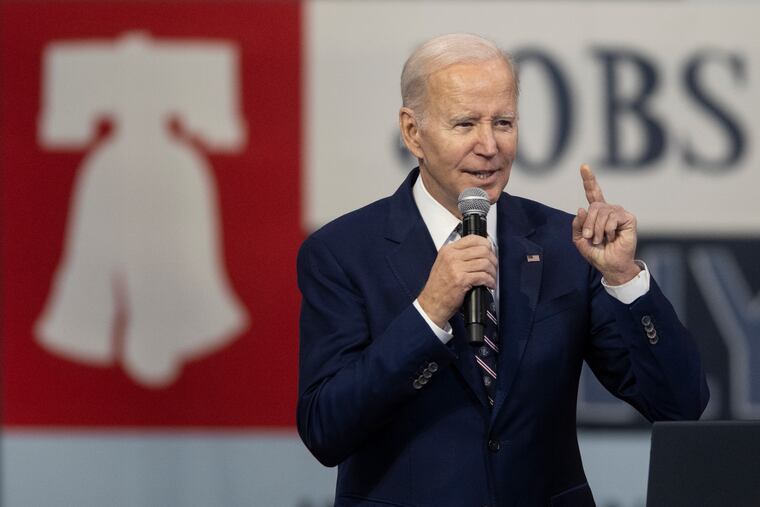Biden’s Philadelphia visit sets the stage for his clash with the GOP, and maybe for his reelection bid
The president’s budget has virtually no chance of becoming law but will frame the debate coming over federal debt and underpin his likely bid for reelection.

Standing in a union training site in Northeast Philadelphia, President Joe Biden said Thursday his latest economic outline would boost middle-class families as he rolled out a federal budget that doubles as a political marker for a coming showdown with congressional Republicans, and a likely presidential campaign in 2024.
The $6.8 trillion blueprint has virtually no chance of becoming law, given Republican control of the U.S. House. But Biden’s plan, and his policy wish list, will frame the debate coming over raising the country’s borrowing limit, and avoiding a catastrophic default on U.S. debt. It will also likely underpin the message the president will carry into an expected reelection bid.
“Here’s why I’m here today: For too long, working people have been breaking their necks. The economy’s left them behind, working people like you, while those at the top get away with everything,” Biden said.
He later added, “My budget’s about investing in America, and all of America, including places and people and folks who’ve been forgotten.”
A campaign atmosphere
The political nature of his proposal was underscored by the unusual setting in Philadelphia.
Instead of a staid launch at the White House marked by fact sheets and charts, Biden visited a pivotal city in a critical swing state. In Northeast Philadelphia, an area known for its robust union presence, Biden made his opening pitch in the kind of white, working-class community where Democrats have struggled recently — Donald Trump won the ward in 2020 — but where Biden hopes his policies help win voters back.
“I’m president because of you guys,” he told laborers at the Finishing Trades Institute of the Mid-Atlantic, which trains painters, drywall finishers, glaziers, and other tradespeople.
» READ MORE: President Joe Biden outlines budget proposal in Philly speech
Despite being a White House event, the president’s speech had many of the trappings of a campaign stop. Biden spoke on the floor of a large training hall, with union members standing on scaffolding above waving small American flags. Attendees wound around construction equipment on their way in. A few laborers held “Joe 4 PA” and “Glaziers 4 Biden” signs. He was introduced by a union member who had apprenticed in drywall finishing. Biden frequently referred back to the labor audience to emphasize his points.
He spent much of his address not on his spending plan but recounting his past accomplishments — such as emphasizing a $35 cap on insulin prices for Medicare recipients — while blasting “MAGA Republicans.”
White House aides highlighted his pledges to protect Medicare and Social Security — a promise that drew the loudest cheers at the Philadelphia event — even as the programs face long-term shortfalls; cut taxes for working families by restoring the expanded child tax credit; raise taxes on big businesses and the wealthy, those earning more than $400,000 a year; and invest in manufacturing, training programs, paid family leave, health-care subsidies, and law enforcement.
“No billionaire should be paying a lower tax than somebody working as a schoolteacher, or a firefighter, or any of you in this room,” Biden said.
His budget would boost spending from about $6.3 trillion now to about $10 trillion in 2033, but trillions of dollars in new taxes would more than offset the growing expenditures. While the annual federal deficit would still rise, the White House said Biden’s plan would cut the shortfall compared with existing policies by nearly $3 trillion over 10 years.
Republicans call Biden’s plan ‘reckless’
Republicans blasted Biden for not cutting spending far enough, and chastised him over growing federal debt.
“President Joe Biden’s budget is a reckless proposal doubling down on the same Far Left spending policies that have led to record inflation and our current debt crisis,” the House Republican leadership said in a joint statement Thursday.
While Republicans said little about rising deficits during Trump’s administration, and voted then to raise the country’s debt ceiling to pay its existing obligations, the GOP is now calling for major spending cuts to do the same under Biden.
“In the next 10 years, the federal government will spend over $10 trillion on interest alone,” said the Republican statement. “We must cut wasteful government spending. Our debt is one of the greatest threats to America and the time to address this crisis is now.”
» READ MORE: Biden budget aims to cut deficits nearly $3T over 10 years
Congressional Republicans plan to lay out their spending plan in April and are eyeing steep cuts in federal programs, though they say they will not touch Medicare and Social Security. Democrats argue that the reductions needed to cut the deficit without tax hikes, as the GOP proposes, would kneecap both the economic recovery and programs everyday people rely on.
“How are they going to make the math work? What are they going to cut?” Biden asked in Philadelphia.
Biden’s plan includes some $5 trillion in tax increases, including raising taxes on individuals making $400,000 or more, or couples making $450,000 and up; quadrupling the tax on stock buybacks; proposing a minimum 25% tax on the wealthiest 0.01% of taxpayers; and hiking the corporate tax rate to 28%, from 21%.
By contrast, Biden offers a tax cut to most parents. His plan calls for reinstating the child tax credit that was passed when he came into office in 2021. That credit provided most parents $3,600 per year for children younger than 6, and $3,000 for older children. It helped deliver a significant reduction in child poverty but expired after one year.
Staff writer Julia Terruso contributed to this article.